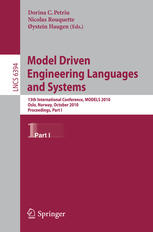

Most ebook files are in PDF format, so you can easily read them using various software such as Foxit Reader or directly on the Google Chrome browser.
Some ebook files are released by publishers in other formats such as .awz, .mobi, .epub, .fb2, etc. You may need to install specific software to read these formats on mobile/PC, such as Calibre.
Please read the tutorial at this link: https://ebookbell.com/faq
We offer FREE conversion to the popular formats you request; however, this may take some time. Therefore, right after payment, please email us, and we will try to provide the service as quickly as possible.
For some exceptional file formats or broken links (if any), please refrain from opening any disputes. Instead, email us first, and we will try to assist within a maximum of 6 hours.
EbookBell Team

4.8
24 reviewsThe MODELS series of conferences is the premier venue for the exchange of - novative technical ideas and experiences focusing on a very important new te- nical discipline: model-driven software and systems engineering. The expansion ofthisdisciplineisadirectconsequenceoftheincreasingsigni?canceandsuccess of model-based methods in practice. Numerous e?orts resulted in the invention of concepts, languagesand tools for the de?nition, analysis,transformation, and veri?cationofdomain-speci?cmodelinglanguagesandgeneral-purposemodeling language standards, as well as their use for software and systems engineering. MODELS 2010, the 13th edition of the conference series, took place in Oslo, Norway, October 3-8, 2010, along with numerous satellite workshops, symposia and tutorials. The conference was fortunate to have three prominent keynote speakers: Ole Lehrmann Madsen (Aarhus University, Denmark), Edward A. Lee (UC Berkeley, USA) and Pamela Zave (AT&T Laboratories, USA). To provide a broader forum for reporting on scienti?c progress as well as on experience stemming from practical applications of model-based methods, the 2010 conference accepted submissions in two distinct tracks: Foundations and Applications. The primary objective of the ?rst track is to present new research results dedicated to advancing the state-of-the-art of the discipline, whereas the second aims to provide a realistic and veri?able picture of the current state-- the-practice of model-based engineering, so that the broader community could be better informed of the capabilities and successes of this relatively young discipline. This volume contains the ?nal version of the papers accepted for presentation at the conference from both tracks.